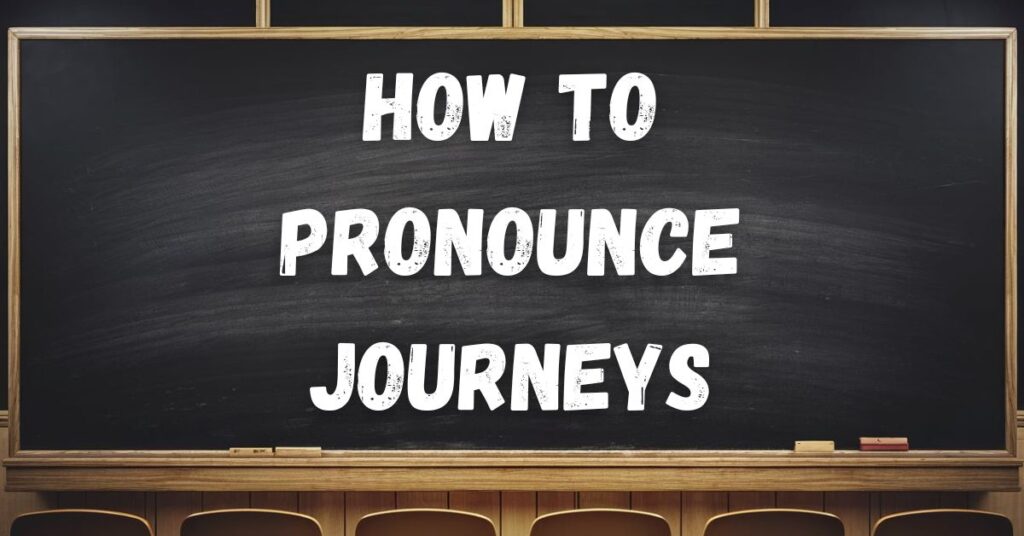Journeys or journies can often confuse writers and speakers alike. While these two terms might seem similar, they hold distinct meanings that can impact the clarity of your communication.
The correct plural form is “journeys,” referring to multiple trips or experiences, while “journies” is simply a common misspelling that lacks recognition in standard English. Understanding the difference between these two words is crucial for effective writing and conversation.
In this article, we will explore the nuances of journeys and journies, delve into the rules of pluralization, and provide examples to help you use the correct term confidently in your writing.
What’s the Difference Between Journeys and Journies?

The primary difference between journeys and journies lies in their correctness. Journeys refers to multiple trips or experiences, while journies is simply a common misspelling of the word.
Using the wrong form can lead to misunderstandings and may make your writing appear less professional. It’s important to remember that when discussing more than one journey, you should always use “journeys.”
What is the Correct Plural of “Journey”?
The correct plural of “journey” is “journeys.” This follows standard pluralization rules in English grammar. Typically, when a word ends in a consonant followed by a vowel and then an “y,” you simply add “s” to make it plural.
For example, “party” becomes “parties,” and “journey” becomes “journeys.” This rule helps maintain clarity in writing and ensures that your message is easily understood.
Is “Journies” or “Journeys” the Right Plural Form?
In every context, journeys is the right plural form. Unfortunately, many people mistakenly write journies, which can lead to confusion.
This error often occurs due to a misunderstanding of how to apply English spelling rules correctly. It’s crucial to recognize that using the correct term not only enhances your writing but also reflects your understanding of basic grammar rules.
Understanding the Rules for Pluralizing “Journey”
To grasp how to pluralize words like “journey,” it’s helpful to understand some basic grammar rules. Words ending in “ey” typically just add an “s” for their plural form.
For instance, you say “key” and “keys.” This rule applies consistently across many words in English, making it easier for writers to remember how to form plurals correctly.
Origins of the Word Journey
The word journey dates back to around 1200, originating from the Old French term journée, meaning “a day’s length or travel.”
This, in turn, comes from Vulgar Latin diurnum, derived from Latin diurnus, meaning “of one day.” Initially, it referred to a defined course of travel or one’s path in life, evolving to encompass various meanings related to travel by land or sea.
Journies: Definition and Usage

As mentioned earlier, journies is simply an incorrect spelling of journeys. It does not have a recognized definition in standard English usage.
Writers should avoid using this form altogether to ensure clarity and professionalism in their work.
Journies Meaning and Uses
Since journies is not a valid word, it holds no meaning or usage in formal writing or conversation. Using this term can lead to confusion among readers who expect proper grammar and spelling.
Journeys: Definition and Usage

Journeys refers to multiple trips or experiences that one undertakes. It can denote physical travel—such as vacations or expeditions—or metaphorical journeys that reflect personal growth or life changes.
For example, someone might say they are on a spiritual journey as they explore their beliefs and values.
Journeys Meaning and Uses
The term journeys can be applied in various contexts. In travel writing, it might describe adventures across different countries or cultures.
In literature, it can symbolize character development or emotional growth. The versatility of this term makes it rich with meaning across different scenarios.
Synonyms for Journeys

If you’re looking for alternatives to the word journeys, consider these synonyms:
- Trips
- Travels
- Expeditions
- Voyages
- Treks
- Adventures
- Excursions
- Pilgrimages
- Odysseys
- Sojourns
Each synonym carries its own nuance but generally relates back to the concept of traveling or experiencing something new.
Side by Side Comparison
| Aspect | Journeys | Journies |
| Definition | The plural of journey; multiple trips. | A misspelling; no recognized meaning |
| Correctness | Correct usage in all contexts | Incorrect; should be avoided |
| Grammatical Role | Noun; plural form of journey | Not valid in standard English |
| Example | “We had many journeys last summer.” | “We had many journies over the years.” (Incorrect) |
| Usage Context | Use when referring to more than one trip. | Avoid using “journies.” Always correct it to “journeys.” |
Everyday Usage Examples

To illustrate proper usage, consider these sentences: “Our journeys through life shape who we are,” or “She documented her journeys across Europe.”
Both examples highlight how journeys can refer to both literal travels and metaphorical experiences.
Journies Example
An incorrect usage example would be: “We had many journies during our vacation.” , “We had many journies during our vacation”
This sentence should be corrected to: “We had many journeys during our vacation.” , “We had many journeys during our vacation,”
Why “Journies” is Incorrect
The term journies is incorrect because it does not follow established spelling rules for forming plurals in English.
Many people make this mistake simply due to a lack of familiarity with proper grammar rules.
Common Misuse of “Journies”
Many people mistakenly use “journies” instead of “journeys.” This common error can occur in both casual writing and speech. Here are a few examples of misuse:
- “Our journies took us to several countries.”
- “She shared her journies on social media.”
- “He reflected on his past journies during the interview.”
Journeys Usage Example

Here are some examples of the word “journeys”:
- “Her journeys through Asia opened her eyes to new cultures.”
- “Their journeys across Europe were filled with unforgettable adventures.”
- “His journeys have taken him around the world.”
- “Our family’s journeys to national parks created lasting memories.”
Examples in Context
In various contexts, journeys can represent physical travel, emotional growth, or personal development. They encompass adventures, life experiences, and transformative paths that shape who we are.
Read More About: Oversight vs Oversite: What’s the Difference?
Travel Context:
In travel literature, one might say: “Her journeys through Asia opened her eyes to new cultures.”
Metaphorical Usage:
In personal development discussions, you might hear: “Life’s journeys teach us valuable lessons.”
Historical or Fictional Context:
In literature, authors often use journeys symbolically; for instance: “The hero’s journey represents his transformation throughout the story.”
Sample Sentences Using “Journeys”
Here are some sentences showcasing different uses of journeys:
- “Our family’s journeys created unforgettable memories.”
- “He wrote about his emotional journeys in his memoir.”
- “The artist’s journeys through various styles reflect her growth.”
How to Pronounce “Journeys”

To pronounce journeys, say it as /ˈdʒɜrniz/. Breaking the word down into syllables can enhance clarity when discussing travels or experiences, ensuring that your audience understands the term correctly in both spoken and written contexts.
Read More About: Usage or Useage: What’s the Difference?
FAQS: Journeys or Journies
What is the correct plural of journey?
The correct plural of “journey” is “journeys,” formed by simply adding “s” to the end of the word.
Why is Journeys not IES?
“Journeys” ends in “ey,” so the plural is formed by adding “s” instead of changing to “ies,” which applies to words ending in a consonant followed by “y.”
Why is it journeys instead of journies?
It is “journeys” because that is the grammatically correct spelling; “journies” is a common misspelling.
Why aren’t Journeys journies?
“Journeys” is the accepted spelling in standard English, while “journies” does not exist as a recognized word.
Is it career journeys and journies?
It is “career journeys,” as “journeys” is the correct plural form of “journey.”
Conclusion
Understanding the distinction between journeys or journies is essential for clear communication. Always remember that “journeys” is the correct plural form, while “journies” is a common misspelling that should be avoided.
Using the right term not only enhances your writing but also reflects your grasp of English grammar rules. Whether discussing travel or metaphorical experiences, employing the correct terminology will ensure your message is conveyed effectively.
Embrace the journey of mastering language, and you’ll find your communication skills greatly improve.

